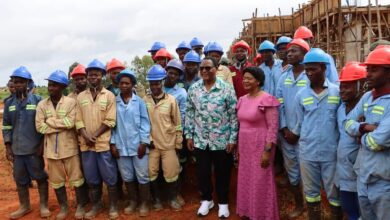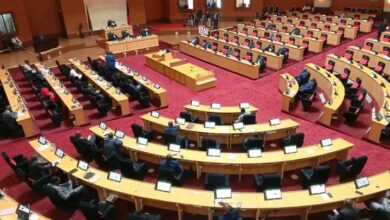News
VP Usi Hails USAID, Partners for Transforming Malawian Communities

By Twink Jones Gadama
Vice President of the Republic of Malawi, Right Honorable Dr. Michael Usi, has commended USAID and its partners for their role in transforming Malawian communities through the Titukulane Project.
The project, which was launched in 2019, has been instrumental in addressing environmental and social challenges in Malawi.
Speaking during the close-out ceremony of the project, Dr. Usi emphasized the importance of collaborative efforts in addressing national challenges.

He noted that the project has demonstrated the effectiveness of a proactive approach to tackling environmental and social challenges.
“Since its launch in 2019, the project has shown that unity and commitment can turn challenges into opportunities,” Dr. Usi said. “By supporting proactive strategies aligned with the National Resilience Strategy (2018–2030), the project has empowered communities to embrace climate-smart agriculture, inclusive governance, and sustainable practices.”
The Vice President also highlighted the generational impact of the initiative, noting its emphasis on sustainability and its use of research and data to capture the voices of the people.
Dr. Usi shared observations from the project, highlighting its success in addressing stigma and gender inequality.
He praised men from Bimbi and Traditional Authority Kuntumanji in Zomba for their willingness to embrace roles traditionally seen as female.
The Titukulane Project, which translates to “let’s develop together,” has been implemented by CARE Malawi and its partners, including Emmanuel International, International Food Policy Research Institute (IFPRI), National Smallholder Farmers Association of Malawi (NASFAM), Save the Children, and WaterAid.
The project aims to achieve sustainable, equitable, and resilient food and nutrition security for ultra-poor and vulnerable households in Mangochi and Zomba districts.
It has three core purposes: increasing stable and equitable incomes from agriculture and non-agriculture livelihoods; improving the nutritional status of children under five years of age, adolescent girls, and women of reproductive age; and building institutional and local capacities to reduce risk and increase resilience among poor and very poor households.
Pamella Kuwali, Director of CARE Malawi, reinforced the Vice President’s sentiments, describing the Titukulane Project as pivotal in addressing challenges such as climate change and resilience-building.
The project has left an indelible mark on Malawi, standing as a testament to the power of unity and proactive strategies in building resilience, inclusivity, and sustainability for future generations.






